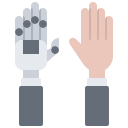Artificial Intelligence and Healthcare Robotics
Artificial Intelligence (AI) and healthcare robotics are revolutionizing the modern medical landscape, bringing innovative solutions to some of the industry’s most pressing challenges. By integrating advanced algorithms and robotics, healthcare providers can enhance patient outcomes, streamline clinical workflows, and introduce new ways of interacting with technology in medicine. This fusion of AI and robotics is making healthcare more predictive, personalized, and accessible, ultimately benefitting not only practitioners but also patients and the systems designed to support their well-being.
Advanced Medical Imaging
Artificial intelligence has drastically improved the accuracy and speed of interpreting complex medical images like MRIs, CT scans, and X-rays. Machine learning algorithms are trained on vast datasets, allowing AI systems to recognize patterns, detect anomalies, and even predict potential issues that may not be immediately visible to the human eye. When combined with robotics, these images can guide precise interventions, enabling automated or robotic-assisted procedures that reduce human error and fatigue. In turn, this results in quicker diagnoses and more effective treatment planning, ensuring that patients receive the right care at the right time while reducing the time burden on healthcare professionals.
Robotic Surgery Innovations
Robotics in surgery, powered by intelligent AI systems, represent a major breakthrough in minimally invasive procedures. Surgeons now use robotic arms that mimic human movements but with far greater precision and steadiness, minimizing the size of incisions and reducing patient recovery periods. AI further enhances these systems by assisting with real-time decision-making and providing predictive insights drawn from patient data. This fusion of robotics and AI not only allows for intricate procedures previously considered too risky but also supports improved outcomes by minimizing complications and ensuring a higher level of surgical accuracy.
Personalized Treatment Pathways
Artificial intelligence assists healthcare professionals in crafting personalized treatment plans tailored to individual patient needs. By analyzing massive datasets—including genomics, patient history, and lifestyle factors—AI algorithms can predict how different patients will respond to specific treatments. Coupled with robotics, this data-driven approach enables precise administration of therapies, such as targeted drug delivery or adaptive physical rehabilitation. The result is better targeted and more effective care, reduced trial-and-error in treatment selection, and an overall improvement in patient satisfaction and recovery rates.
Previous slide
Next slide

Enhancing Patient Care and Monitoring
Intelligent care robots equipped with AI capabilities are now assisting medical staff in daily activities such as delivering medications, transporting medical supplies, and guiding patients within healthcare facilities. These robots are designed to interact naturally with patients and adapt their assistance according to individual needs and preferences. By automating routine but critical tasks, intelligent robots allow healthcare professionals to focus on more complex patient care, reduce workload, and improve the overall efficiency and safety of the care environment.
Shaping the Future of Medical Research
The combination of AI and robotics is drastically reducing the time and cost it takes to discover and develop new drugs. Machine learning algorithms rapidly analyze extensive chemical libraries to identify promising molecules and predict their efficacy and safety profiles. Robotics automate the synthesis and testing of these compounds, running experiments at scales and speeds inconceivable for human scientists alone. As a result, researchers can quickly prioritize candidates for clinical trials, accelerating the journey from laboratory research to real-world treatments and offering hope for faster cures to previously intractable diseases.

